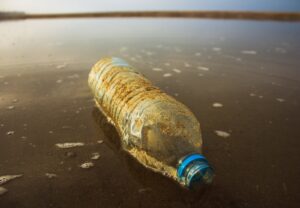Kidney stones are a common health condition that affects millions of people worldwide. These small, hard mineral deposits form in the kidneys and can lead to significant pain and discomfort. While there are several factors that can contribute to the formation of kidney stones, one question that often arises is whether bottled water can cause kidney stones.
I. What are Kidney Stones?
Kidney stones are solid, pebble-like deposits made up of calcium, oxalate, and other substances that can accumulate in the kidneys. They vary in size and shape and can cause intense pain as they pass through the urinary tract. Common symptoms of kidney stones include severe back or abdominal pain, blood in the urine, and frequent urination.
The Link between Bottled Water and Kidney Stones
The idea that bottled water can cause kidney stones stems from the fact that some brands of bottled water contain high levels of minerals such as calcium and magnesium. These minerals are known to contribute to the formation of certain types of kidney stones. However, it’s important to note that not all bottled water brands have high mineral content, and the impact of bottled water on kidney stone formation is still a subject of debate among experts.
Some studies have suggested a link between high mineral content in drinking water and an increased risk of kidney stone formation. For example, a study published in the Journal of Urology found that drinking hard water with high calcium and magnesium levels was associated with a higher prevalence of kidney stones. However, it’s worth noting that this study focused on tap water rather than specifically bottled water.
On the other hand, other studies have found no significant association between bottled water consumption and kidney stone formation. In fact, a study published in the Journal of Endourology examined the mineral composition of various brands of bottled water and concluded that the calcium and magnesium levels were generally low and unlikely to contribute to kidney stone formation.
It’s important to remember that kidney stone formation is a complex process influenced by multiple factors, including diet, genetics, and overall hydration levels. While some types of bottled water may contain minerals that could potentially contribute to kidney stone formation, it’s unlikely that bottled water alone is a significant risk factor for developing kidney stones.
For those concerned about kidney stone formation, it’s generally recommended to maintain a balanced and varied diet, drink plenty of fluids (including water), and seek medical advice if experiencing symptoms or at high risk for kidney stones.
II. The Role of Water in Kidney Stone Formation
When it comes to kidney stone formation, the role of water intake cannot be overlooked. Water plays a crucial role in preventing kidney stones by diluting the substances that can lead to stone formation and by flushing them out of the body. Here’s how water intake affects kidney stone risk:
How Water Intake Affects Kidney Stone Risk
1. Dilution of Urine: Adequate water intake helps in diluting the concentration of substances like calcium, oxalate, and uric acid in the urine. When these substances are highly concentrated, they are more likely to crystallize and form kidney stones. Drinking enough water ensures that these substances are adequately diluted, reducing the risk of stone formation.
2. Preventing Dehydration: Dehydration can increase the risk of developing kidney stones. When the body is dehydrated, the urine becomes more concentrated, making it easier for crystals to form and develop into stones. Staying hydrated by drinking enough water throughout the day helps in preventing dehydration and reducing the risk of stone formation.
3. Flushing Out Kidney Stone-Causing Substances: Increasing water intake promotes frequent urination, which helps in flushing out the substances that can lead to the formation of kidney stones. By increasing urine volume, water helps in preventing the accumulation of minerals and other substances that can potentially form stones.
Can Bottled Water Increase the Risk of Kidney Stones?
There is no scientific evidence to suggest that bottled water specifically increases the risk of kidney stones. The important factor is maintaining a sufficient overall water intake, regardless of whether it comes from tap water, bottled water, or other sources. It is the hydration status that matters rather than the source of water.
However, it is worth noting that the composition of different types of bottled water can vary. Some bottled waters may contain higher mineral content, such as calcium or magnesium, which could potentially contribute to stone formation in individuals who are susceptible to certain types of kidney stones. It is recommended to consume water with a balanced mineral composition and consult a healthcare professional if you have specific concerns about mineral content in your drinking water.
In conclusion, adequate water intake is essential in reducing the risk of kidney stone formation. It helps to dilute urine, prevent dehydration, and flush out stone-causing substances. While the source of water, including bottled water, may vary in mineral content, it is overall water intake that is critical for kidney stone prevention. Maintaining a healthy level of hydration by drinking enough water throughout the day is key to reducing the risk of kidney stone formation.
III. Mineral Content in Bottled Water
The Presence of Calcium and Other Minerals
When it comes to drinking water, people often consider the source and quality. One aspect that may raise concerns is the mineral content in bottled water. Different brands of bottled water can vary in their mineral composition, including the presence of calcium and other minerals that may play a role in kidney stone formation.
Calcium is a mineral that is essential for various bodily functions, including bone health. It is also a common component of many types of kidney stones. While consuming an adequate amount of calcium is important for overall health, excess calcium intake can contribute to the formation of kidney stones in some individuals.
The mineral content of bottled water is typically listed on the label, allowing consumers to make informed choices. However, it’s important to note that the mineral content can vary significantly between brands and even different batches of the same brand.
The Impact of Mineral Content on Kidney Stone Formation
The relationship between the mineral content in bottled water and kidney stone formation is complex and not fully understood. While some studies suggest that certain minerals in water, such as calcium, may increase the risk of kidney stone formation, other studies have found no significant association.
It is worth noting that the risk of developing kidney stones depends on various factors, including genetics, diet, hydration, and overall health. Simply drinking water with a higher mineral content does not guarantee the development of kidney stones.
It is recommended to maintain a balanced diet, including an adequate intake of water, to help prevent kidney stone formation. Consuming a variety of fluids, including bottled water, can contribute to proper hydration and kidney health.
If you have a history of kidney stones or are concerned about their formation, it is essential to consult with a healthcare professional for personalized advice. They can help assess your risk factors, provide dietary recommendations, and guide you in choosing the most suitable water for your needs.
It’s important to remember that the information provided here is for general informational purposes and should not substitute for professional medical advice. Kidney stone formation and prevention can be influenced by various factors, including not just mineral content in water but also overall diet and lifestyle choices.
For more information on kidney stones, their causes, and prevention strategies, consider visiting the dedicated Wikipedia page on the topic.
IV. pH Levels in Bottled Water
Acidic vs. Alkaline Water
When it comes to the pH levels of bottled water, there is a range of options available. pH is a measure of the acidity or alkalinity of a substance on a scale of 0 to 14, with 7 being neutral. pH levels below 7 are considered acidic, while pH levels above 7 are considered alkaline. It is important to note that the pH levels of water can vary depending on the brand and source.
Some bottled water brands promote their products as being alkaline, claiming health benefits associated with higher pH levels. Alkaline water typically has a pH level above 7, often ranging from 8 to 9.5. On the other hand, traditional bottled water tends to have a neutral pH around 7, similar to tap water.
The Influence of pH on Kidney Stone Development
The relationship between bottled water pH levels and the development of kidney stones is a topic of ongoing research and debate among medical professionals. Kidney stones are solid formations that can develop in the kidneys when there is an imbalance of various substances, such as calcium, oxalate, and uric acid, in the urine.
It is believed that highly acidic urine, with a pH level below 6, can increase the risk of certain types of kidney stones, such as uric acid and cystine stones. On the other hand, highly alkaline urine, with a pH level above 7.5, can contribute to the formation of calcium phosphate stones. However, it is important to note that factors like genetics, diet, and overall health also play significant roles in kidney stone formation, and pH level alone may not be the sole determining factor.
While some studies suggest that consuming alkaline water may help reduce the risk of kidney stone formation by increasing urine pH levels, more research is needed to establish conclusive evidence. Additionally, it is crucial to consult with a healthcare professional before making any significant changes to your diet or water consumption habits.
It is important to note that maintaining a proper hydration level is crucial for overall health, including kidney health. Drinking an adequate amount of water throughout the day can dilute urine and potentially reduce the risk of kidney stone formation. It is recommended to consume at least 8 cups (64 ounces) of water daily, regardless of the specific pH level.
In conclusion, the influence of bottled water pH levels on kidney stone development is still a topic of debate. While highly acidic or alkaline urine can affect the risk of certain types of kidney stones, other factors also play significant roles. It is always best to consult with healthcare professionals for personalized advice and guidance regarding kidney health and hydration.
V. Other Factors to Consider
When it comes to kidney stone prevention, there are several other factors to consider, including the difference between bottled water and tap water and the role of hydration. Let’s explore these factors further to gain a better understanding:
Bottled Water vs. Tap Water
Bottled water has gained popularity in recent years, with many people opting for its convenience and perceived health benefits. However, when it comes to kidney stone prevention, both bottled water and tap water have their pros and cons.
Tap water:
- Tap water is generally more affordable and easily accessible.
- It is regulated by governmental bodies to ensure its safety and quality.
- The mineral content in tap water varies depending on the source, which can affect the risk of kidney stone formation.
- It may contain trace amounts of minerals such as calcium and magnesium, which can contribute to kidney stone formation in some individuals.
Bottled water:
- Bottled water provides a convenient option for hydration, especially when on the go.
- It often undergoes additional purification processes, which may remove minerals that could contribute to kidney stone formation.
- However, the mineral content in bottled water can vary depending on the brand and source.
- Some bottled waters may be labeled as “spring water” or “mineral water,” indicating a higher mineral content, which may not be suitable for individuals prone to kidney stones.
It is important to note that the impact of bottled water versus tap water on kidney stone formation can vary depending on individual factors, such as their overall diet and medical history. It is best to consult with a healthcare professional for personalized recommendations.
The Role of Hydration in Kidney Stone Prevention
Proper hydration plays a crucial role in kidney stone prevention. When the body is adequately hydrated, it helps dilute urine and promotes the regular flow of urine, reducing the risk of kidney stone formation. Here are some key points to consider:
- Water intake: Drinking enough water is key in preventing kidney stones. The adequate intake of water can vary depending on individual factors, but a general recommendation is to drink at least 8 cups (64 ounces) of water per day. This amount can be adjusted based on factors such as activity level, climate, and overall health.
- Urine color: Monitoring urine color is a simple way to gauge hydration levels. Ideally, urine should be pale yellow or clear. Darker-colored urine may indicate dehydration.
- Other hydrating beverages: While water is the best choice for hydration, other beverages such as herbal tea, fruit-infused water, and diluted fruit juices can contribute to overall fluid intake. However, it is important to moderate the consumption of sugary drinks and caffeinated beverages, as they can have diuretic effects.
Adequate hydration, along with a balanced diet and lifestyle, can help reduce the risk of kidney stone formation. However, individuals with specific medical conditions or a history of kidney stones should consult with a healthcare professional for personalized recommendations.
VI. Conclusion
After reviewing the available data and studies, it can be concluded that bottled water alone is not a direct cause of kidney stones. Kidney stones are typically formed due to a combination of factors, including dehydration, diet, genetics, and underlying medical conditions. While some studies have suggested a potential correlation between certain bottled waters and an increased risk of kidney stones, more research is needed to establish a definitive link.
However, it is important to note that the quality of the water consumed can play a role in kidney stone formation. Some bottled waters may contain higher levels of minerals, such as calcium and oxalate, which are known contributors to kidney stone formation. It is advisable for individuals who are prone to kidney stones to consult with a healthcare professional to determine the best water sources and hydration practices for their specific needs.
Guidelines for Maintaining Optimal Kidney Health
While bottled water may not be a direct cause of kidney stones, there are several guidelines individuals can follow to maintain optimal kidney health:
1. Stay Hydrated: Adequate hydration is crucial for preventing kidney stone formation. Aim to drink plenty of fluids, preferably water, throughout the day to ensure proper hydration.
2. Watch Your Diet: Limit intake of high-oxalate foods, such as spinach, rhubarb, and nuts, as these can contribute to the development of kidney stones. It is also important to maintain a balanced diet that is low in sodium and high in fruits and vegetables.
3. Be Mindful of Mineral Content: Pay attention to the mineral content of the water you consume. If you have a history of kidney stones, it may be beneficial to choose water with lower levels of calcium and oxalate. Consult with a healthcare professional or a registered dietitian for personalized recommendations.
4. Regularly Monitor Kidney Function: Schedule regular check-ups with your healthcare provider to monitor your kidney function and identify any potential issues early on. This can help prevent the development of kidney stones or catch them at an early stage.
5. Seek Professional Advice: If you have a history of kidney stones or are concerned about your kidney health, it is best to seek professional advice from a healthcare provider or a registered dietitian. They can provide personalized recommendations and guidance based on your individual needs.
In conclusion, while bottled water alone may not directly cause kidney stones, it is important to maintain a healthy lifestyle and follow the guidelines for optimal kidney health. By staying hydrated, watching your diet, and seeking professional advice, you can reduce the risk of kidney stone formation and support overall kidney health.




